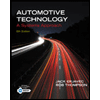04%, respectively. The the fuel entering the e e power: (b) friction
04%, respectively. The the fuel entering the e e power: (b) friction
Automotive Technology: A Systems Approach (MindTap Course List)
6th Edition
ISBN:9781133612315
Author:Jack Erjavec, Rob Thompson
Publisher:Jack Erjavec, Rob Thompson
Chapter9: Automotive Engine Designs And Diagnosis
Section: Chapter Questions
Problem 1RQ
Related questions
Question

Transcribed Image Text:1(d). The brake fuel conversion efficiency of an engine is 30%. The mechanical and combustion
efficiencies are 80% and 94%, respectively. The heat losses to the oil and coolant are 60 kW.
The chemical energy of the fuel entering the engine is 190 kW. What percentage of this
energy becomes (a) brake power; (b) friction power; (c) heat losses; (d) exhaust chemical
energy; (e) exhaust sensible energy?
Expert Solution
This question has been solved!
Explore an expertly crafted, step-by-step solution for a thorough understanding of key concepts.
Step by step
Solved in 3 steps with 3 images

Knowledge Booster
Learn more about
Need a deep-dive on the concept behind this application? Look no further. Learn more about this topic, mechanical-engineering and related others by exploring similar questions and additional content below.Recommended textbooks for you

Automotive Technology: A Systems Approach (MindTa…
Mechanical Engineering
ISBN:
9781133612315
Author:
Jack Erjavec, Rob Thompson
Publisher:
Cengage Learning

Refrigeration and Air Conditioning Technology (Mi…
Mechanical Engineering
ISBN:
9781305578296
Author:
John Tomczyk, Eugene Silberstein, Bill Whitman, Bill Johnson
Publisher:
Cengage Learning

Automotive Technology: A Systems Approach (MindTa…
Mechanical Engineering
ISBN:
9781133612315
Author:
Jack Erjavec, Rob Thompson
Publisher:
Cengage Learning

Refrigeration and Air Conditioning Technology (Mi…
Mechanical Engineering
ISBN:
9781305578296
Author:
John Tomczyk, Eugene Silberstein, Bill Whitman, Bill Johnson
Publisher:
Cengage Learning